[January] [February] [March] [April] [May] [June] [July] [August] [September] [October] [November] [December]
April 1st, 1903
Haydn Wood graduates from the Royal College of
Music, London, with his Associate of the Royal College of Music
Diploma.
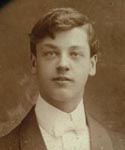
April 2nd, 1945
Haydn Wood completes the score of A British
Rhapsody.
April 3rd, 1928
Evidence of a decline in the demand for English
music publications is shown at the Board of Trade. Publishers
like Chappell give evidence that the sales of sheet music have
decreased, saying that the gramophones are the main cause of
this falling off. Haydn Wood says that he has received as much
from the sale of one copy of sheet music as he has received from
the sale of 17 gramophone records. Last week he was told by a
ship's captain that his ship had been installed with a
gramophone and amplifier to supply music to every part of the
ship instead of having a band. That would mean a reduction in
the sale of sheet music.
April 4th, 1929
Haydn Wood sends a copy of his cantata Lochinvar
for chorus and orchestra to the BBC: 'I shall be glad to know if
it will be of any use for your programmes. The words are so well
known that I think it would be of interest to your listeners.'
Readers at the BBC will be extremely critical and they will not
feel they can recommend it.
April 5th, 1930
Haydn Wood is present at a requiem mass said for
Emma Albani at the Servite Church, Fulham Road, London. The
famous soprano died on April 3rd. When she gave series of
concerts in Canada (1906), Australia, New Zealand and India
(1907), and in Great Britain (from 1904 to 1909), she was
accompanied by Wood on the violin. She actually gave him a break
when he started a career as a professional violinist in 1904.
April 6th, 1939
Haydn Wood receives from the Performing Right
Society the sum of £6-6-0 in respect of attendances at meetings
of the Special Classification Committee on March 13th and April
3rd. This commitee examines arrangements of non-copyright works
with a view to ascertaining whether or not there is sufficient
original material in them to justify their being registered as
copyright arrangements, and in that event to place them in
various grades according to the extent of the arrangers'
original material.
April 7th, 1938
Haydn Wood asks the BBC to note that Variations
on
an Original Theme takes 12 minutes to play, not 10½ as
they have written in the programme they have just sent him for
verification. Wood is to conduct this programme of his own
compositions on May 8th.
April 9th, 1944
A concert takes place at the Officer's Club,
Ilfracombe, North Devon. Soprano Lilian Pope and Haydn Wood on
the violin give a musical scena. Their programme includes A
Brown Bird Singing, Roses of Picardy, and
Wood's latest ballad The Stars Looked Down. They are
accompanied by Lily Seton at the piano.
April 10th, 1902
Haydn Wood with his brother Harry and his sister
Adeline play music at the Kirk Braddan Parochial Tea, in
Douglas, Isle of Man.
April 12th, 1940
Leslie Boosey has written to Haydn Wood about the
title of his Nautical Rhapsody which Boosey is about to publish.
Boosey's partner Ralph Hawkes says that the name "Shanties" is
not known in connection with sea songs in America and suggests
that the title should be changed to The Seafarer with
a subtitle A Nautical Rhapsody. Wood answers that he
thinks the revised title with the subtitle is excellent: 'I
never did quite like "Shanties" on account of my having used a
similar title (Sea Shanties) in my Frescoes
suite.'
April 13th, 1893
Haydn Wood's brother Harry gives his Fourth Annual
Students' Orchestral and Operatic Concert at the Grand Theatre,
Douglas, Isle of Man. Master Haydn Wood plays in the violin
section of the orchestra which is conducted by Harry. And he
plays with Lawrence Rushworth a duet for two violins by Langey.
April 14th, 1954
Haydn Wood gives a two-minute interview on the BBC
Home Service in the programme "My Friends the Composers", at
6.30 pm from the Æolian Hall, London. He has rehearsed the
interview in the afternoon.
April 16th, 1946
Haydn Wood sends a list of some of his compositions
which are available on records to the Composers, Authors and
Publishers Association of Canada. He encloses a true story about
Roses of Picardy which may be of interest to Canadian
listeners. The Canadian Association is preparing a series of
radio scripts called "Songs of the Nations" and "All the World
Sings".
April 18th, 1898
Harry Wood and his Grand Concert Party gives a
concert at the Liberal Hall, Slaithwaite, Yorkshire. Master
Haydn Wood plays on the violin Romance and Gavotte
from Mignon (Ambroise Thomas). His other solo is Air
Varié in D (Vieuxtemps) and he responds to an encore with
Home Sweet Home (Henry Bishop) with variations. His
brother Daniel gives flute and piccolo solos. Their sister Eliza
plays the piano accompaniments. A similar programme will be
given at the neighbouring towns of Meltham and Marsden on April
19th and 20th.
April 19th, 1932
Haydn Wood asks his publisher Leslie Boosey if
there are any complimentary tickets for the John McCormack
concert. If so, 'I should greatly obliged if you could let me
have a couple. I shall quite understand if there are not. By the
way, I do hope you will let him see a copy of Shy Is My
Love.' Tenor John McCormack has recorded a few Haydn Wood
songs and he will record a few more later.
April 20th, 1932
Leslie Boosey is willing to publish a book of six
violin obbligatos out of seven that Haydn Wood has written to
famous songs by various composers. But Wood is not happy with
Boosey's financial offer: 'I consider your offer of eight
guineas inadequate for the amount of work and thought I put into
these arrangements … I might add that I paid a pianist a couple
of guineas to try them over several times with me before I
submitted them for your approval. Also, though I do not consider
myself a slow worker, it took me a week to complete the set of
seven pieces … Personally, I see possibilities of the album
being useful for teaching purposes as I have carefully edited it
as regards bowing and fingering.' Publisher and composer will
agree on a ten guineas fee, and the album will eventually be
published in February 1933 with five obbligatos written by Wood
and one written by Howard Fisher. The collection includes a
violin obbligato to Bird of Love Divine, which is the
only obbligato to any of his own songs that Wood ever got
published.
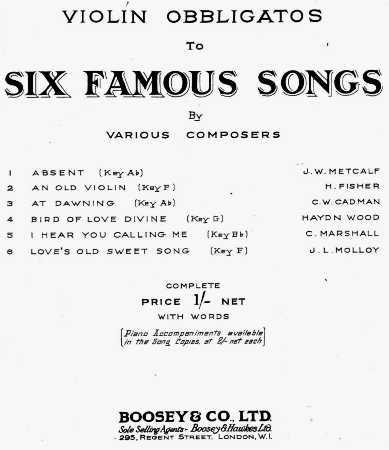
April 22nd, 1944
Haydn Wood conducts a programme of his own
compositions for the BBC General Forces Programme, broadcast
live from Bedford. It is a 30-minute concert including his new
overture Eros, A Manx Pastoral Scene, Firelight
(Caprice), The Seafarer (A Nautical Rhapsody)
and Seville(Fiesta). Eros is recorded for
further broadcasts.
April 24th, 1938
Haydn Wood hears his Manx Tone Poem Mannin
Veen broadcast by Joseph Lewis for the first time with
organ. He writes and asks the BBC if they 'could find a niche
for it in the forthcoming Proms … I feel sure it would be
particularly successful with organ.'
April 25th, 1948
Haydn Wood writes to Douglas Lawrence, Light Music
Supervisor at the BBC: 'I find that the most important date in
the Isle of Man, Tynwald Day, is on July 5th. As you probably
know this is equivalent to St. George's Day & St. Andrew's
Day etc on the mainland. If you have an opportunity should I be
asking too much if you would include a Manx work of mine in one
of your programmes. I have several to choose from. I know the
Manx people would appreciate it immensely.'
April 27th, 1920
Haydn Wood agrees to Chappell's proposal to arrange
It Is Only a Tiny Garden as a quartette for female
voices, also the terms, 10 % of the marked price.
April 29th, 1938
Haydn Wood is a guest conductor in the Grand
Concert given in the Town Hall, Worthing, Sussex. He conducts
the Worthing Symphony Orchestra in his own compositions: suite Cities
of
Romance, Manx Tone Poem Mannin Veen, and the
first concert performance of overture Life and Love.
[January] [February] [March] [April] [May] [June] [July] [August] [September] [October] [November] [December]
May 1st, 1940
Haydn Wood writes to Major O'Donnell, Military Band
Conductor at the BBC, to thank him for an excellent broadcast of
his May Day overture this afternoon. 'I do not think I
have ever heard this work on a military band before and I
enjoyed the experience very much, as I did your entire programme
… It is a great disappointment to me that Aschergerg's cannot
see their way to publish my suite Paris for military
band. It is a very expensive business, I know, but the march
from it, Montmartre, is crying out for a military band
edition.'
May 2nd, 1941
Haydn Wood writes to the Secretary of the
Performing Right Society and asks to be excused from attending
the next meeting of the Board of Directors: 'I have just
returned from Yorkshire, where I have been to attend a funeral,
and the travelling conditions were so appalling that I dread
another train journey so soon [from North Devon to London].'
May 3rd, 1897
Haydn Wood enters the Royal College of Music in
London. He will study the violin under Señor Arbos and the piano
as second study. From September 1900 he will take composition as
second study under Charles Wood, and from January 1902 as
principal study under Charles Villiers Stanford.
May 4th, 1947
Haydn Wood gives an orchestral and choral concert
of his own compositions at the Palace Coliseum, Douglas, Isle of
Man. The concert is organized by the Rotary International in
Great Britain and Ireland for the members of the Annual
Conference. Wood conducts A Manx Rhapsody, Manx
Tone Poem Mannin Veen, Two Manx Countryside Sketches,
Ode to Genius and Torch of Freedom.
May 7th, 1934
Haydn Wood agrees to the terms set out by his
publisher Ascherberg Hopwood & Crew, related to the French
edition of Prelude which is to be published in Paris
by Francis & Day.
May 8th, 1938
Haydn Wood conducts the BBC Orchestra in a
programme entitled "Music in Manuscript". This concert of his
own music - still in manuscript - include overture Harlequinade,
Variations on an Original Theme, Scherzo in the
Olden Style, and the first performance of rhapsody King
Orry.
May 10th, 1905
Haydn Wood finishes composing the adagio of a
concerto in B minor for violin and orchestra. It is not known
whether he composed the other two movements.
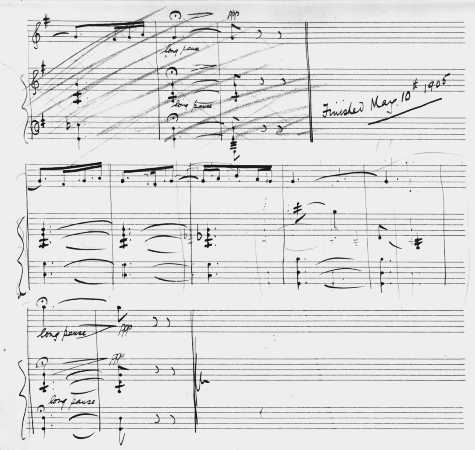
The last page of the arrangement for violin and piano.
May 11th, 1933
Haydn Wood cannot agree to Chappell's suggestion of
a 3d. royalty per copy - instead of 4d. - on the vocal version
of his Love Song. Wood has composed a piano solo
first, for which Bruce Sievier has written the lyrics. Sievier
would receive the deducted 1d. per copy sold. Wood writes: 'On
several of the songs I have written lately, I have been asked to
reduce my royalty. I have agreed to this although it is not in
the terms of my contract. However, I will meet you again in the
matter and suggest that I receive a 3½d. royalty on the first
ten thousand copies sold and 4d. after that amount.'
May 12th, 1919
Haydn Wood assigns to Messrs. Chappell & Co.,
the whole of the copyright for all countries in the music of the
opera entitled Tregaldabas. The libretto is written by
Captain Harry Graham.
May 15th, 1955
Haydn Wood dedicates to his great niece Marjorie
Cullerne a copy of his Two Little Pieces for violin,
and sends it to her in Vancouver, Canada. She will like them,
practise and play them often.
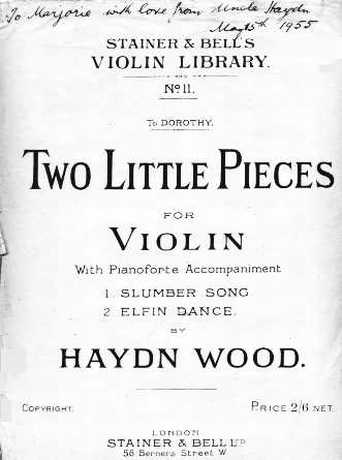
May 17th, 1954
Haydn Wood writes to Perceval Graves: 'I am
agreeable for you to undertake my biography on the terms you
suggest … We are going to Yorkshire later on, so I will look
through any material my sister may have to see if there is
anything of further interest.' But later on, Wood will phone
Graves and say: 'What do they want to know about my life for?
No, I simply can't go on with it,' and he will ask Graves to
release him from the agreement.
May 18th, 1902
Haydn Wood is a guest violinist in the Grand Sacred
Concert organized by his brother Harry at the Palace, Douglas,
Isle of Man. He plays Hungarian Melodies by Hauser, a
Romance by Svensden, and the Gavotte from Mignon
by Ambroise Thomas.
May 19th, 1946
A concert in aid of the Mayor's Welcome Home Fund
takes place at the Regal Cinema, Barnstaple, North Devon. Haydn
Wood has organized the concert and invited local and well-known
artists. The programme includes his Barcarolle for
flute, his songs The Stars Looked Down and A
Brown Bird Singing, and the first performance of his new
song A Thousand Beautiful Things. Wood accompanies his
songs at the piano.
May 22nd, 1945
While he is passing through London on his way to
the BBC Bedford for a couple of broadcasts, Haydn Wood looks for
a house or flat. He is currently living in North Devon and he
will eventually move back to London by the end of July 1946.
May 24th, 1945
Haydn Wood conducts the BBC Theatre Orchestra at
the Corn Exchange, Bedford. They are recording Wood's music for
programmes to be broadcast in Latin America.
May 25th, 1945
Haydn Wood conducts the BBC Theatre Orchestra in a
concert of his own music for the BBC General Forces Programme,
live from the Bedford School. The programme includes The
City and A State Ball at Buckingham Palace from
the London Cameos suite, A Manx Pastoral Scene,
the first performance of A British Rhapsody, the
andante sostenuto of his violin concerto (soloist, Alfred
Barker), Fairy Revels from A Day in Fairyland,
and A Southern Rhapsody, Virginia.
May 26th, 1921
Haydn Wood sends to his publisher Chappell a copy
of a waltz Love's Fragrance by Florence Walker, which
is now published by H. Sharples & Son under the title of Valse
Lilah. The reason he is sending this waltz is because
there are 18 bars of the waltz-song Wood wrote for the musical
play Tina. The matter will be amicably settled by the
publishers, and Wood will be paid one penny per copy sold of Valse
Lilah.
May 27th, 1945
Haydn Wood submits to the BBC a programme of his
compositions entitled "Round the World in an Hour with Haydn
Wood": 'If the idea appeals to you for a broadcast … I should be
happy to act as a Cook's guide and personally conduct this world
tour.' Stanford Robinson, BBC Director of Music Productions,
will turn the idea down.
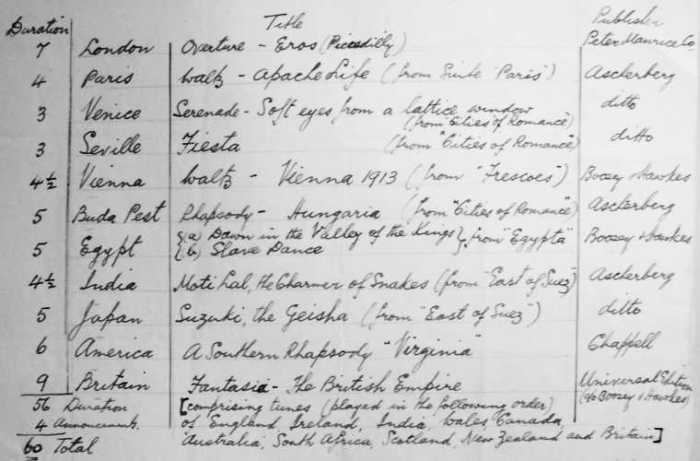
Wood will send his suggestion again in September 1947. The BBC will eventually broadcast a 45 minute concert "Round the World with Haydn Wood", by Reynolds Payne and His Orchestra on April 17th, 1950.
May 29th, 1927
Haydn Wood with Dorothy are at the marriage of
their close friend Herbert Clayton to Flore Brousseau, at the
Strand registry office, London. Herbert Clayton is a theatrical
producer and manager in the successful firm of Clayton and
Waller. Wood has composed for them the musical plays Suzanne
(1923), Tilly and Archie (1924). And he has
invested in their production of No No Nanette in 1925.
May 30th, 1945
The Directors of the Performing Right Society,
including Haydn Wood, have a dinner at the Savoy Hotel, London.
[January] [February] [March] [April] [May] [June] [July] [August] [September] [October] [November] [December]
June 2nd, 1913
Willem Mengelberg conducts the London Symphony
Orchestra in Haydn Wood's piano concerto, with Tina Lerner at
the piano.
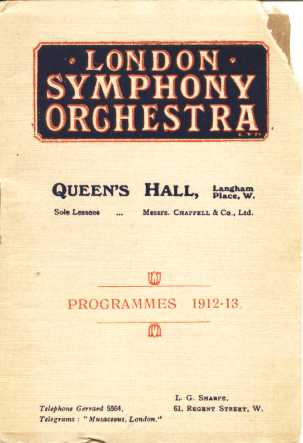
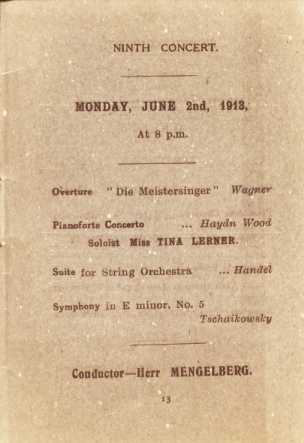
June 3rd, 1943
Haydn Wood appears with local artistes in the Grand
Variety Concert which is given at Holiday Camp, Westward Ho!,
North Devon.
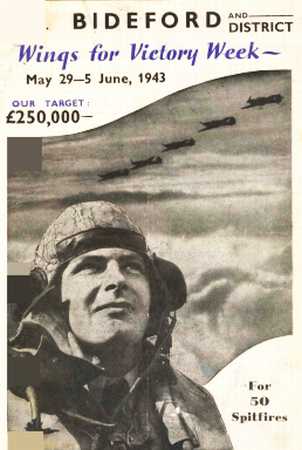
June 4th, 1906
Madame Albani's Concert Party give the last concert
of their Canadian tour in the Market Hall at Charlottetown. They
have toured Canada for three months and a half from Halifax to
Victoria and back. Haydn Wood has accompanied Albani on the
violin in arias by Mozart. And he has played duets with Adela
Verne at the piano, and well-known violin solos.
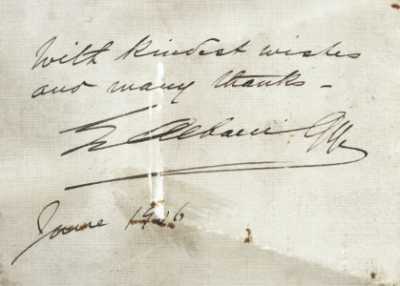
June 6th, 1949
Haydn Wood cuts the tape to open the Kingsley Hall,
the new Community Centre at Westward Ho!, North Devon.
June 7th, 1913
Haydn Wood with his brothers Harry and Daniel go to
the Epsom Derby. Harry puts money on the 6/4 favourite
Craganour. But Craganour is disqualified for bumping and the
race is awarded to the 100/1 outsider Aboyeur.
June 8th, 1945
Haydn Wood writes to Dr. Hely-Hutchinson, Director
of Music at the BBC: 'I hear on the wireless this morning that
TM the King & Queen are visiting the Isle of Man for the
Tynwald ceremony on July 4th. May I suggest that half an hour of
my Manx music during that day might be considered appropriate. I
know from my connection with the Island it would please the Manx
people!' Ronald Biggs, Music Programme Organiser, will answer
that the BBC's complete reorganisation of programmes has
required rather longer notice for suggestions such as Wood's,
and that they will not be able to avail themselves of it.
June 12th, 1951
Haydn Wood asks his publisher Boosey & Hawkes
to send the material of his violin concerto to the Spa Light
Music Festival at Scarborough.
June 13th, 1901
The new Concert Hall at the Royal College of Music,
London, is opened in the presence of the Duke of Cambridge and a
large audience. Haydn Wood plays in the first violins section of
the Pupils' College Orchestra conducted by Professor C. Villiers
Stanford. And he plays as a soloist Introduction and Rondo
Capriccioso in A minor, op. 28 by Camille Saint-Saëns.
June 16th, 1940
Haydn Wood listens to the Reginald King Quartet on
the radio, and he writes to the BBC to ask why Roses of
Picardy was not played as advertised in the Radio Times.
Kenneth Wright, Assistant Director of Music, will answer:
'Forgive me for feeling disappointed that in days rendered
hectic by the precipitous rush of momentous events, I must use
valuable minutes pointing out to you something which we had
hoped was felt instinctively by every listener in the country.'
Roses of Picardy was omitted because the BBC considered
what was happening in northern France, and thought that the song
and its title might have intensified the general grief.
June 17th, 1906
Madame Albani and Haydn Wood are back to the United
Kingdom from Canada. They give a concert in London at the Royal
Albert Hall.
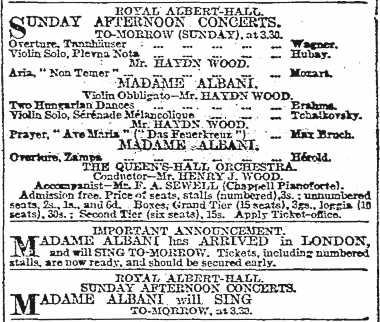
June 20th, 1939
The Evening News publishes an article by Haydn
Wood:
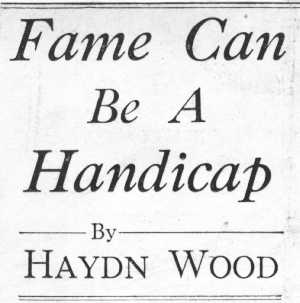
'I am quite sure my own more important works would have been treated with far greater respect had I not made myself notorious as the man who composed Roses of Picardy. Personally, I am somewhat impatient of this musical snobbery.'
June 21st, 1949
'To Dorothy, With my love, Haydn.' This is how
Haydn Wood signs a printed copy of his newly published
composition for orchestra, Soliloquy. The mood set up
in this dreamy impressionistic piece is one of intimacy and
tenderness befitting a dedication from a loving composer to his
wife.
June 22nd, 1910
Haydn Wood and his nephew Hilton Cullerne go to the
Yorkshire-Northamptonshire cricket match at Bramall Lane,
Sheffield. Northamptonshire win by 5 wickets.
June 23rd, 1941
Haydn Wood sends the piano conductor of A
Stanford Rhapsody, "Westward Ho!" to his publisher Leslie
Boosey. 'Personally, I am very pleased indeed with the way it
has panned out.' Boosey and his partner Ralph Hawkes will answer
that they are 'most enthusiastic about it.' Boosey had asked
Wood to undertake the writing of an orchestral rhapsody on
Charles V. Stanford's Songs of the Sea which were
inspired by the county of Devon. Wood started working on A
Stanford Rhapsody in April, while he was still living in
Westward Ho!, Devon. Its composition will continue through March
1942 due to the special attention Wood himself, Boosey and
Stanford's son Guy, will give to the rhapsody. Boosey &
Hawkes will finally publish it in 1947 when they have overcome
the war difficulties. Wood will dedicate the work 'to the memory
of Sir Charles Villiers Stanford, who taught me the technique of
composition.'
June 25th, 1953
Haydn Wood attends the 39th anniversary luncheon of
the Performing Right Society at Connaught Rooms, London.
June 26th, 1954
The first performance of a Gipsy Rhapsody
by Haydn Wood is amongst the works at today's concert of the BBC
Light Programme Music Festival at the Royal Festival Hall,
London. The London Light Concert Orchestra is conducted by Rae
Jenkins. And Haydn Wood himself conducts the first performance
of his Spring, Allurement. Both works are recorded by
the BBC.
June 27th, 1951
At the Spa Light Music Festival in Scarborough,
Yorkshire, Haydn Wood conducts the first performance of his new
composition A Yorkshire Suite for orchestra. Wood was
born in Yorkshire and he specially wrote the suite for the
Festival.
June 28th, 1947
Haydn Wood and Dorothy go to the Glyndebourne
Festival to see the opera Alfred Herring by Benjamin
Britten. Britten himself conducts the orchestra. This trip to
Glyndebourne is organized for the delegates of the 14th Congress
of the International Confederation of Authors' and Composers'
Societies. Both Haydn and Dorothy have often been socializing
this week with the Congress delegates.
June 29th, 1905
Haydn Wood conducts the first performance of a
suite for full orchestra, at the Royal College of Music Patron's
Fund Concert, at the Queen's Hall, London. Wood composed the
suite while he was completing his violin studies in Brussels in
1903-1904. It consists of three movements, an Andante con
moto, a short set of variations on a theme in B minor,
and a Polonaise.
June 30th, 1928
Haydn Wood signs and sends back to his publisher
Chappell a receipt of the sum of three guineas for his
orchestral arrangement of his Three Songs of June. He
encloses a short note: 'I should like to point out that is only
a nominal fee as I do not wish my acceptance of so small an
amount to create a precedent.'
[January] [February] [March] [April] [May] [June] [July] [August] [September] [October] [November] [December]